|
All
through February, some of India's 50 million mobile phone subscribers
received text messages on their phones from the country's Department
of Telecommunications (dot), urging them to report international
calls they received that either did not show where the call was
originating or showed it as having originated elsewhere within the
country. The message was the logical next step in the department's
crusade against Reliance Infocomm, India's largest private telco.
And it came in the wake of similar public-service ads released in
the newspapers by companies such as VSNL, part of the Tata Group,
and India's largest international long distance telephony player,
part of the telecommunication industry's battle against illegal
international calls.
By some estimates, between 33 per cent and
50 per cent of the six-billion telephone minutes that came into
India in 2004 took the illegal channel. Calls from the us account
for a third of the market (in terms of minutes) and almost half
of them are routed through illegal international telephone exchanges
(complex as the term may sound, all it takes is an internet protocol
device, a leased line from an internet service provider and a Cisco
router, and India has more than enough techies with the rudimentary
network construction skills required to patch them together). On
the basis of the existing Access Deficit Charge (ADC) regime, a
kind of subsidy that is paid out to fixed telephony providers-state-owned
telcos, BSNL and MTNL, which together serve 45 million fixed telephony
subscribers are the biggest gainers-for operating in seemingly unprofitable
rural and remote areas, that's a loss of some Rs 1,000 crore. For
those who would like to do their own back-of-the-envelope thing,
the ADC on an international call is Rs 3.25 a minute.
The dot
text message, however, was not motivated by a desire to battle shady
illegal exchanges operating out of basements or terraces in Delhi's
Karol Bagh or Chennai's Triplicane. Rather, it was prompted by a
desire to put one over Reliance, which had wilfully violated the
ADC regime, offering as explanation its HCDS or Home Country Direct
Service operation. Here's how this works: Reliance sells low-cost
pre-paid calling cards to India in the us, even forging relationships
with large telcos operating in that market whose customers could
dial a toll-free number, enter their pre-paid card details, and
call anywhere in India. The call travels through Reliance's own
undersea network, terminates on its own network from where it is
transferred, as a local or domestic long distance call to the target.
The HCDS logic is sound (the service is legal
under Indian and international telecomunication laws), but it doesn't
change the fact that Reliance has flouted an existing regulation
(the fact that the company allegedly strips the header, which identifies
the point of origination of the call, doesn't help its cause; nor
does the argument that caller line identification is a value-added
service). Now, if only dot can leverage its get-Reliance drive into
going after the illegal exchanges.
-Kushan Mitra
CRANKLOG
Transcript
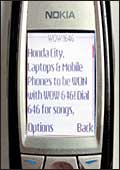 9.01
a.m: Sir, I am calling from XXXX (bank). You can take a pre-approved
personal loan ... 9.01
a.m: Sir, I am calling from XXXX (bank). You can take a pre-approved
personal loan ...
10.10 a.m (message):
For insurance policies ...
12.01 p.m: Sir,
I am calling from XXXX (an Indian bank). Any home loan requirement?
12.05 p.m: Sir,
I am calling from XXXXX (same Indian bank as above). Any home loan...
12.20 p.m: Message
from telco providing service advertising its caller tunes service
2.40 p.m: Sir,
I am calling from XXXX (rival telco). Would you ...
3.21 p.m: Sir,
I am calling from XXXXX (hotel chain). Would ...
3.45 p.m: Sir,
I am calling from XXXXX (bank). We have ...
4.04 p.m: Sir,
I am calling from XXXXX (new private insurance firm). Can I ....
Well, at least the Prime Minister of the country
doesn't call people on their mobile phones these days and ask for
their support.
SECOND
The Credit Rater's Credit Rater
Or how Rakesh Jhunjhunwala's three-year bet
on CRISIL has paid off.
 |
| Market value? Jhunjhunwala's smile is
probably worth Rs 61.75 crore |
In
February 2002, when the scrip of CRISIL, India's most respected
credit rating agency, was trading at around Rs 230, Rakesh Jhunjhunwala,
now 45, a chartered accountant by qualification and an investor
by choice, started acquiring stock in the company. With wife Rekha,
he acquired a 2.66 per cent stake in CRISIL by the end of March
2002, upped this to 7.91 per cent by the end of June 2002, then
13.02 per cent by March 31, 2003. Today, the couple holds a 14.3
per cent stake in the company, higher than that of CRISIL's promoter
ICICI Bank (10.77 per cent), and Standard & Poor's (9.48 per
cent). The latter has just announced a voluntary conditional open
offer for a 51 per cent controlling stake in the company; it needs
to net 2.64 million shares for the offer to go through; and the
Jhunjhunwalas own a little under a million (908,091 to be exact).
At the offer price of Rs 680, 195 per cent higher than the price
at which the Jhunjhunwalas first acquired their shares, the couple's
stake is worth Rs 61.75 crore. Not that they have decided to sell.
"I am still evaluating the offer," says Jhunjhunwala.
The man is in the plush environs of his 15th-floor office in Mumbai's
financial district Nariman Point. The S&P offer, he admits,
took him by surprise. He stops short of saying so, and the I-always-knew-this-would-pay-off
claim remains unsaid, but Jhunjhunwala, Partner, Rare Enterprises,
looks satisfied. He has always spoken fondly of crisil, and it is
also his largest investment, in terms of percentage of holding.
The open offer, however, does not open till April 6 and Jhunjhunwala
is pre-occupied with other things-like what Budget 2005 will bring.
Jhunjhunwala has always been a bull. "I
am bullish on India," he says, a sentiment he has often expressed.
Circa Februray 2005, for instance, he has great hopes of IDBI (financial
sector), Matrix (pharma), Pantaloon (retail), Geometric Software
(it) and Bilcare (packaging), five companies that figure prominently
in his portfolio. "These are sectoral leaders, have a scalable
business model and a competent management team," he explains.
"I acquired them at attractive valuations." Given his
record at crisil, investors could do worse than follow his example.
Jhunjhunwala's belief in CRISIL stems from
similar reasons: the company is a leader in its business, is professionally
managed and boasts unique skills, and is a pure cash flow business
whose prospects are linked to the performance of the financial sector
in India. "If India has to grow, CRISIL too will grow,"
he says pithily, adding that he evaluates investments on the basis
of the opportunities before a company and the possibility of growth.
Given that S&P's acquisition of CRISIL can only bode well for
the company, the Jhunjhunwalas may well decide to let the offer
before them pass.
-Roshni Jayakar
India's
New Satellites
Near-by alternatives for some of the country's
most happening cities...
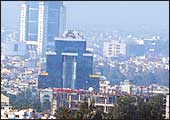 |
| Gurgaon: Original satellite |
In
a flanking strategy that has taken the government of Karnataka by
surprise, Tamil Nadu is positioning Hosur, a border town a mere
45 kilometres from Bangalore, as an alternative for companies that
have had enough of the city's poor infrastructure. Delhi has as
many as four satellites, Gurgaon, Noida, Faridabad and Ghaziabad,
with the first emerging as the new central-business-district and
prosperous suburb rolled into a dotted-with-malls one. Mumbai has
had one since 1973, when the Thane Creek Bridge came up, although
Navi Mumbai is only now coming into its own (a million people live
there; it boasts 344 sq. km of land that can be developed; it is
connected by a six-lane expressway to Pune; and hosts 700 companies
representing every major manufacturing and it company in the country).
"This is the city of the century," gushes Ramanand Tiwari,
Principal Secretary (Urban Development), Maharashtra. "It is
well planned, connected and offers a good standard of life; Mumbai
is now an old city." Here's how the satellites for Bangalore,
Chennai and Hyderabad stack up. Kolkata? Well, the city's got room
to spare for companies and individuals.
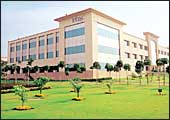 |
| Infosys @Hyderabad: Next stop Vizag? |
Hyderabad
Cyberabad is just around 15 km from Hyderabad,
but the satellite has never really taken off; it is more an extension
of Hyderabad, less a self-sustaining proposition. Not surprisingly,
the Andhra Pradesh government is looking at Vishakapatnam as an
alternative to Hyderabad. "It is the next best city in the
state and we see investors from it companies, even it park developers,
showing a preference for it," says J.C. Mohanty, Principal
Secretary (it & Communications), Andhra Pradesh. Still, at an
800-km drive from Hyderabad, it is no satellite.
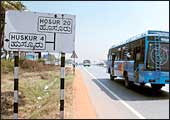 |
| Hosur: Better roads, but not there yet |
Chennai
This one doesn't lend itself to guessing games.
Urban planners are convinced the ideal solution in Chennai's case
is a combination of three satellite towns, Maraimalai Nagar to the
south-west of the city, Gummidipoondi to the north and Tiruvellore
to the west. Each is at a distance of 42-45 km from the city and
will soon be linked to each other, and the planet (for want of a
better term) by road and rail. "Development of just one of
the three would result in lopsided growth," explains G. Dattatri,
a former urban planner and UN consultant. For the record, Maraimalai
Nagar already houses the Ford plant, Gummidipoondi, Sundram Fasteners,
and Tiruvellore, Hindustan Motor's Mitsubishi Lancer plant and Caterpillar
India.
Bangalore
Hosur it is. The name literally translates
into 'new town' and it is a mere 45 km away from Banga-lore. Even
better, Electronics City, where most it companies have their campuses,
is exactly halfway between Bangalore and Hosur (and the Hosur roads
are better). Hosur, however, is more a factory-town than anything
else right now, and its provincial milieu presents a stark contrast
to Bangalore's happening after-work life. "We are constantly
investing in infrastructure," says Shankar Linge Gowda, it
Secretary, Karnataka, who is convinced most people would prefer
to live and work in Bangalore.
-Priya Srinivasan, with Nitya
Varadarajan, E. Kumar Sharma and Venkatesha Babu
Q&A
"We Need More Efficient Drug R&D"
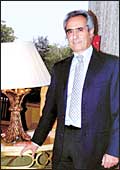 |
| "The risk in pharma is higher, so the
returns need to be higher" |
As
the newly appointed President of Eli Lily's international operations,
Lorenzo Tallarigo is responsible for all of the drug major's
non-us businesses. Recently in India to meet with key government
officials, Tallarigo, a doctor by education, spoke to BT's R.
Sridharan on India's product patents regime and the $11-billion
(Rs 48,400-crore) Eli Lily's future plans. Excerpts:
Are you happy that India has finally entered
the product patents regime?
I feel optimistic. I met Mr. Kamal Nath (Union
Minister of Commerce & Industry), and the minister seems committed
(to an international standard of patents). But I anxiously await
the Bill, because the law has to be clear and unambiguous, so that
there's no scope for misinterpretation. We will continue to watch
(the developments) with a lot of interest.
The Minister has also said that he would
like lowest international price for patented drugs. What's your
reaction?
It's understandable because healthcare and cost
of drugs are sensitive issues, and every government would like prices
to be low. But the fact is drug discovery is getting more and more
expensive. The nature of pathology is more complex, there are regulatory
barriers, clinical trials are long and expensive, and you never
know if a drug will succeed even if you bring it to the market.
Look at Merck's Vioxx. A $2-billion (Rs 8,800-crore) market just
disappeared almost overnight.
So are you saying drugs can't be priced
any lower?
No. We need to make R&D more efficient
and productive, and reduce our costs. I think that'll happen with
developments in areas like genomics, which will help us better understand
drug targets. But there are no magic solutions.
Is Big Pharma greedy? Somebody told me that
the top 10 pharma companies in the Fortune 500 make as much profits
as the other 490...
You have to understand that risk in pharma is
higher, therefore, returns need to be higher. (Stock) markets want
that kind of returns. Merck's Vioxx is typical of our risks. Traditionally,
pharma used to have a premium of 15 to 18 per cent over S&P
500. These days, pharma is at a discount of 15 to 18 per cent over
S&P 500. Pharma is under pressure.
Foreign
Hand
il Mio Dio! Tanti Italiani
 |
| Montezemolo: Say cheese |
It may or may not
have to do with the fact that the most powerful person in India
is of Italian origin, but between February 14 and February 18, the
Italians came calling in force, the President of the country itself,
four ministers, and countless CEOs and provincial pashas. Here's
a quick tally:
Number of companies: 150
Number of CEOs in attendance: 30
Number of people involved: Over 10,000
Regions wooing Indian companies: 8
Number of business events: 15
Number of cultural events: 5
Most photographed CEO: Fiat's Luca di Montezemolo
-Amanpreet Singh
|





 9.01
a.m:
9.01
a.m:




